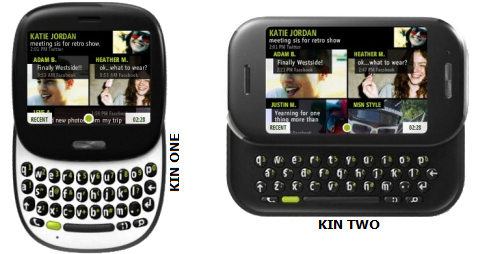Microsoft's Kin: The (much needed) Generation Y perspective

I've taken this past 24 hours to really soak in the news of Microsoft's mobile announcement. Officially announced yesterday, two phones named the KIN One and the KIN Two, these devices will be aimed at teenagers, students and the Generation Y to take control of their online social lives.

Just so we're all on the same page, courtesy of CNET, here is what was announced.
I'll start off gently and openly applaud Microsoft for taking this strong stance and seemingly popular move. As far as corporations go, the student market is often neglected and not taken into account. Microsoft has taken this step over the last few years, especially since the start of this calendar year, by including the Generation Y as part of their target audience and remit. Forget what they have actually produce; that isn't important in this context. The fact they have shifted their focus and shuffled their internal strategy - this alone - should be applauded.
- Read more: Mary Jo Foley's coverage of "Pink"
And now the bad news. These devices are doomed to fail, and when they inevitably do, they will take Microsoft's Generation Y focus down with it. This is worst case scenario, in my opinion. But the reasons are important to take to note.
Who says what, exactly?
Why has Facebook become so popular with students, with other lesser used social networks like Bebo about to face the firing squad? In a nutshell, the reason is simple; the reasoning however may not be, but stick with me on this one. Facebook is popular because we as a generation chose it to be. There were no advertisements or marketing as such to entice students and teenagers in - just the fact that the ripple effect of our friends joining spurred the rest of us into joining ourselves.The Generation Y choose the technology, the products and the services to use and to buy. The market doesn't dictate to us, and we do not usually conform to products or services "aimed" at us. If we want to use it, we will, but not because a company or organisation says we should based on what they offer.
Twitter isn't a huge thing for students, still. Five months ago, I said Twitter isn't really for students unless you have something to promote. I use it for work, mostly. Those who are involved in student societies, student union's or political activity use it a fair bit but for not really for personal gain.
There will be no applications for the Kin phones
This says it all, really, and there is nothing else to say about it. Well, maybe "bah" and "humbug", and "this is why it is doomed to fail", but nothing more.The devices: the good, the bad, and the very, very ugly
They are ugly, aren't they? When I was a younger lad, going back a few years to when I was 13 or so, the science fiction programmes on the television had communication devices which look very similar to the Kin One - similar to those flip-open make-up "things" that women often carry around with them.Times have changed though. One of the reasons the iPhone took off the way that it did was not just the mobile application expandability but also the simplicity and aesthetics of the device. The BlackBerry range is the same; they look modern and fashionable but aren't really aimed at students. The Kin One looks like a relic of the Star Trek days and the Kin Two looks like a blunt instrument you could kill a grown man with.
iPhone users will probably not be convinced. Ina Fried, CNET, said it exactly as I thought it: "The Kin isn't the iPhone".
The network operators need to play ball too.
Seeing as these devices are social network focused, with Facebook, Twitter, text and instant messaging, Microsoft expects these phone users to be sending a fair bit of data across the networks. Well, let's face it: the full QWERTY keyboard gives it away. But Microsoft doesn't control or even have that much say in the data transfer rates of the phone network providers.Verizon Wireless will be selling the device on its network, but has not stated how much the device will cost. If it is in fact aimed at the younger generation, not only will it have to be something we can afford without having to cut our food budget for the month, but also be cheap in the long run. The network features such as streaming music with your Zune Pass, could run up high data usage and therefore high costs.
Having your own in-house femtocell would potentially solve this problem, but you shouldn't be expected to buy additional hardware to keep your network data costs down. The networks will need to ensure that users of these data intensive phones aren't running up data bills higher than their tuition fees.